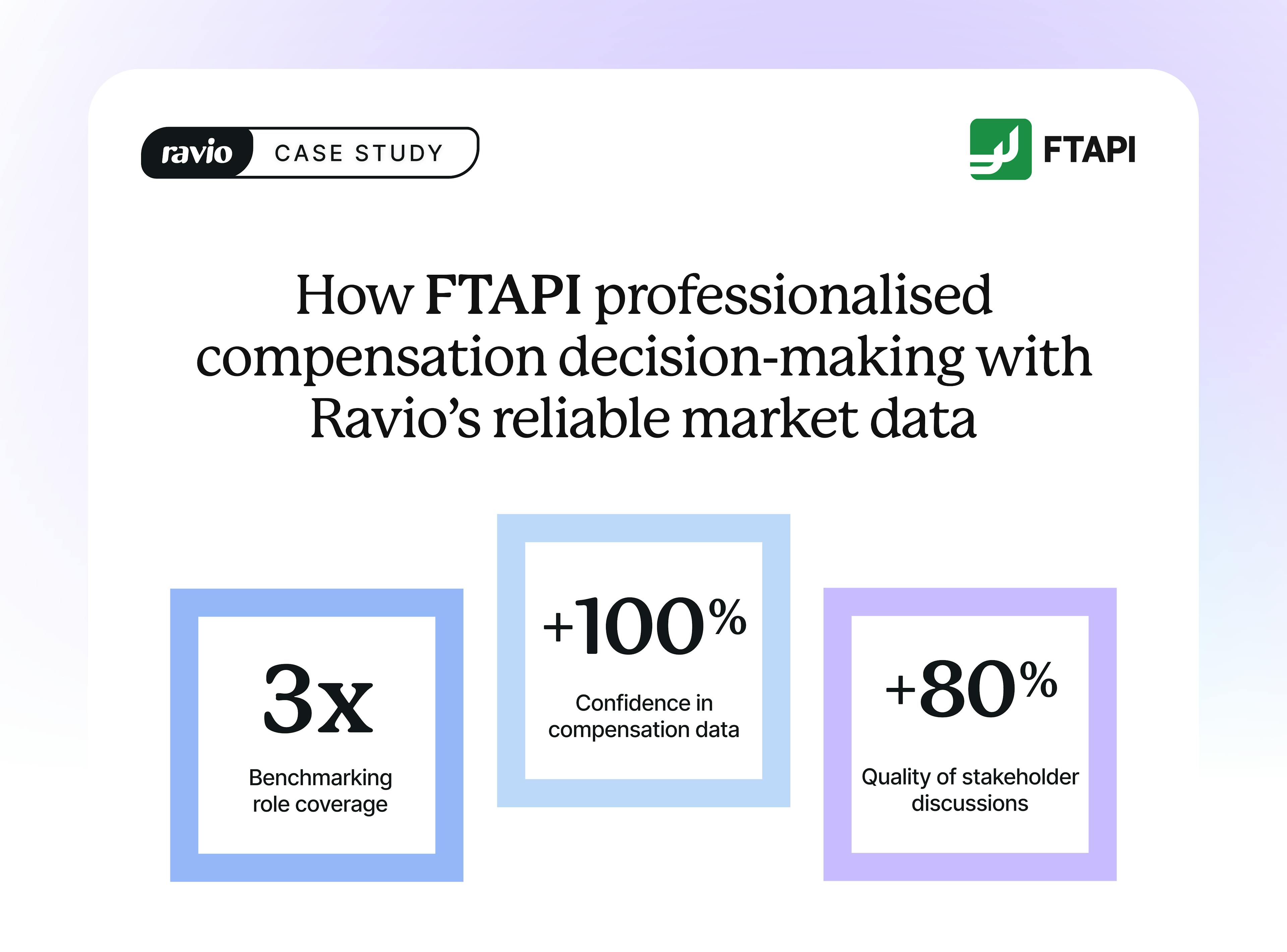From unreliable market data in some locations to explaining why colleagues doing identical work earn different amounts, global compensation strategies can be incredibly challenging.
Yet with remote and flexible work now a top priority for employees, getting it right can be a major hiring and retention advantage.
Olive Turon, Head of People & Culture, knows this too well, leading a fully remote team of 177 across 51 countries, she’s tackled nearly every global pay challenge and built an approach that sets their employer brand apart.
But, with location-flexible working options (think remote, hybrid, work-from-anywhere) fast becoming top-of-the-list of what employees are looking for in an employer, getting global compensation right can also make for a big competitive advantage in hiring and retention.
In this Reward Community Office Hour, Olive joined Ravio’s Chief People Officer, Vaso Parisinou, to discuss the biggest challenges with global compensation, complete with practical insights on how TestGorilla approaches them.
We covered:
- Strategies for handling market data gaps in certain locations
- Managing the administrative complexity of compensation and benefits in 50 different locations
- Communicating how location influences compensation with the team to build trust
- Policies for international relocations
- The role of remote-first working and globally competitive pay in employer branding.
Key takeaways from the webinar
If you're more of a reader than a watcher, here's a few of the most interesting insights from Vaso and Olive's discussion on location agnostic approaches to global compensation.
Key takeaway 1: Global pay philosophy must align with company mission and values
TestGorilla’s flat pay model is a direct extension of their core mission to democratise opportunities for talent. Their approach demonstrates that effective global compensation requires deep philosophical alignment between pay practices and organisational purpose.
"We believe that impact is determined by what you do, and that employees therefore should be remunerated for what you do rather than your postcode."
The company operates on two fundamental principles:
- Access (providing equal opportunity to exciting roles regardless of geography) and
- Fairness (equal compensation for equal value delivered).
This values-driven approach helps attract candidates who align with the company's mission while naturally filtering out those who don't share these principles.
💡 Practical application: Before implementing any global compensation strategy, clearly articulate how it supports your company's mission and values. The approach should feel authentic to your organisation.
Key takeaway 2: Communication strategy is make-or-break for comp philosophies
One of the key learnings Olive shared was that successful compensation communication is about ensuring people understand the logic and principles behind your decisions. Compensation isn’t just a number pulled out of thin air, it’s a well thought out decision.
Employees might not agree with every detail of the compensation approach, but they do need visibility into the framework and logic. That transparency empowers them to evaluate whether the company’s values align with their own, whether they prioritise flexibility, opportunities to work abroad, or salary.
Key takeaway 3: Choose your geographic benchmark strategically
TestGorilla anchors their global pay to ‘Europe’ in market benchmarking data. This is a deliberate choice based on two key factors:
- The company is incorporated in the Netherlands and has a significant European workforce.
- Europe provides a diverse range of cost-of-living scenarios that serves as a kind of proxy for global markets – higher paying markets like the UK or Netherlands, and lower paying markets in Eastern Europe.
💡 Practical application: If you opt for a location agnostic approach to global compensation, consider factors beyond just your headquarters when selecting which geography you benchmark against. Look for regions that represent the diversity of your actual workforce and provide a reasonable proxy for the markets where you hire most frequently.
Key takeaway 4: Address the "golden handcuffs" concern through performance management, not pay adjustments
One major concern with flat global pay is whether employees in lower-cost locations might become complacent due to above-market compensation.
TestGorilla tackles this through skills-based hiring approaches that seek to find employees who are a strong fit for their role based on their skillset, their intrinsic motivation for the mission, and their fit with the working culture of TestGorilla.
From there, rigorous performance standards also ensure that golden handcuffs don’t become an issue.
"We set high standards in terms of performance management, so that the idea that someone might be coasting, it wouldn’t be a very comfortable place to coast."



